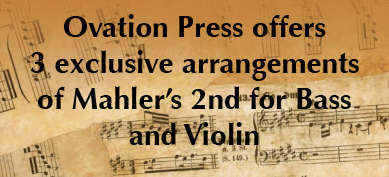- Elizabeth Pitcairn graced audiences last week with her 1720 Stradvarius, known famously as the Mendelssohn Red Violin. She was in Colorado last Thursday afternoon. Just a few days prior she played in support of the UCLA Division of Digestive Diseases.
- Another renowned violinist, Chloe Hanslip, debuted at the Ipswich School Festival of Music in the UK this past Saturday.
- Unfortunately, lack of interest and funding has resulted in a suspension of operations for the Gainesville Orchestra in Georgia. Though they intend to rebound, this came the same day the musicians of the Colorado Symphony Orchestra accepted a 14% pay cut.
 On a brighter symphonic note, the Baltimore Symphony Orchestra received an honorable nod as having given the best performance of Mahler’s Second Symphony “Resurrection” in celebration of the 100 year anniversary since the composer’s death.
On a brighter symphonic note, the Baltimore Symphony Orchestra received an honorable nod as having given the best performance of Mahler’s Second Symphony “Resurrection” in celebration of the 100 year anniversary since the composer’s death.
Finally, a very interesting article published a couple weeks ago explored the idea of musical memory. How exactly does it work and why?
1) Music as a ‘super-skill’ – Music stimulates a number of the sensory and motor systems all at once, especially if you have any history of musical training. But even if you don’t, then music contains stimulation for the brain in the form of complex sound changes, intricate hierarchical patterns, a ‘beat’, and rhythms that trigger our motor systems (when you can’t help but tap your foot!). And we know that memories are more likely to be deep and easy to recall if they have been through a process of elaborate encoding as opposed to simple encoding.
2) Music is everywhere – The ubiquity of modern music, played as it is in our shops, offices, gyms, restaurants and homes, means that our memory system gets plenty of practice in encoding music as part of other experiences. The role of music in many of our important ceremonies and life events (e.g. weddings, funerals, birthdays and New Year) means that some of the most emotional times of our lives, and our subsequent memories of them, will have music involved.
3) Music is personal – Music has no overt referential meaning; unlike language it does not directly refer to the things around us. To put this into an example, try to imagine a piece of music that everyone would agree was about a tree – fairly impossible right?! This is what the academic Ian Cross (Cambridge) once termed as music’s ‘floating intentionality’. In practice, this means that any one piece of music can be interpreted in different ways by different people. It can be a ‘blank slate’ which we can imbue with whatever meaning we would like. This means that music is inherently flexible, and can be built into our memories in a way that is completely unique to you.















No comments yet.